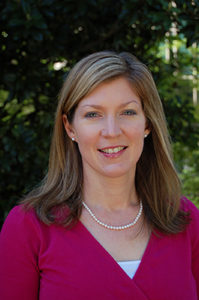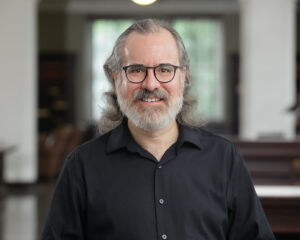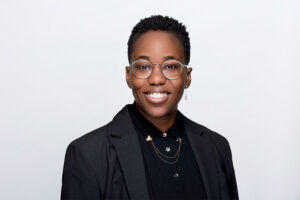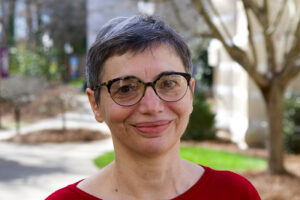Few student-facing library staff members may be as mysterious to undergraduates as the 40+ Emory subject librarians. Through a series of interviews conducted by Emory Libraries Student Ambassadors (ELSA), subject librarians were asked to share more about their roles.
Emory Libraries organizes the work of subject librarians into six broad categories: collection development and management; teaching and learning; engagement & outreach; trends in scholarship; collaboration; and professional development and scholarship & creative endeavors.

Jennifer Elder, subject librarian for education, psychology, and Women’s, Gender, and Sexuality Studies
Jennifer Elder, librarian for education, psychology, and Women’s, Gender, and Sexuality Studies (and more!) emphasized that subject librarians “support our students and departments in whatever research they’re trying to do.”
Subject librarians often provide research consultations for both students and faculty, build library collections, provide tours of the library facilities, and connect students to resources within the University. In summarizing her job, business librarian Saira Raza said that subject librarians “try to make sure that not only can you find the thing that you want to find, but you might also find some other things that you didn’t expect to find, or that really just stimulate your interest and your passion.”
Chris Doty, librarian for chemistry and physics, added, “I think of the subject librarian ultimately as just your own personal librarian – at least, that’s the goal.”
Subject librarians come to the job from a variety of backgrounds. “I came to the U.S. in 1980s as a visiting librarian from China,” shared Chinese Studies librarian Guo-hua Wang. “I continued my education and received an MS degree in Library and Information. I came to Emory in the 90s and built the original Chinese collection almost from scratch.”
Like Wang, James Steffen, Film and Media Studies librarian, has had a longstanding interest in librarianship, noting that he’s always loved libraries. He recalled fondly, “When I was a kid in elementary school [and] I was spending the summer with my grandparents in California, I used to go to the public library and just check out all these crazy adult books that were really beyond my reading level, such as Dante’s Inferno and Hawthorne’s The Scarlet Letter.” James said that librarians he met while getting his PhD in film history from Emory helped him “appreciate the value of the librarians.”
Not all subject librarians planned on pursuing librarianship. When Hannah Griggs, subject librarian for English, received her PhD in English from Emory in 2022, she knew that she “didn’t want to go do the traditional tenure track job […] but I also knew I wanted to stay in a university setting.” She said that working as a subject librarian is “a really lovely bridge between doing research and pedagogy and combines a lot of the best things about graduate school.”
Many subject librarians cited working with students as a primary motivation in their work. “It’s nice to see people grow,” said Dhy Edwardsberry, business librarian. “It’s nice to see people pursue their dreams. It’s nice to help people get closer to those dreams.”
Open Access librarian Jenny Townes added that “it’s just pleasant to be in the library. It’s clean. The quiet areas are quiet. The noisy areas are noisy and happy and fun. And I like that everyone is here to help, like no one sits in their office and hides from students or other people there. Everyone’s here to help and everyone’s available.”
Subject librarians have access to library resources that undergraduates might not know about. Several librarians noted the material purchase requests process, through which librarians can buy library materials on behalf of students. Jennifer Elder mentioned that “a library material could be a book, an e-book, a streaming video, or possibly even a database that [a student is] interested in for their research.”
As the Film and Media Studies librarian, James Steffen helps students “research the rights for films and television programs if a group wants to screen [them] on campus.” Emory Libraries also accepts purchase requests for films, and Steffen says that once a film is in the library collection, “groups on campus can show it without having to ask for permission or to pay additional fees for screening.”
Subject librarians also help students access archival collections. Hannah Griggs called the volume of the literary collections at Stuart A. Rose Manuscript, Archives, and Rare Book Library “mind blowing” and remarked that, “We have the first draft of Alice Walker’s The Color Purple. It was written in a spiral bound notebook, and you can go and look at it and see her edits and you can see the handwritten draft of one of the greatest American novels ever written.”
Rose Library was just one of the physical spaces subject librarians encouraged students to explore within Emory Libraries. Spanish, Portuguese, and Latin American Studies librarian Phil MacLeod said that his favorite place in the libraries is Matheson Reading Room, which is, in his words, “a magnificent space and a little cubby hole of nice leather chairs.”
Even when students aren’t on campus, many of the library collections are available online. “A good way to make use of the Emory Library catalog is using it to find yourself an e-book to read or some interesting films to watch during summer vacation when you are traveling or back home,” recommended Sofia Slutskaya, Russian Studies librarian.
At the end of the day, subject librarians want to emphasize that they are there to help students. Dhy Edwardsberry stressed that “it’s okay to say you don’t know and come get help,” and even if a subject librarian cannot help a student directly, Edwardsberry reassured that “we can always help you get to the right person.”
Jennifer Elder commented that “library support or research support is available 24/7. We have an Ask a Librarian service that you can email, or chat in-person near where you check out books in the main library.”
In advising students on their research, James Steffen noted that research consultations “can happen at any stage” and that subject librarians can provide guidance “if the student has a research paper for a course or if they’re working on an honors thesis or some other kind of larger project.”
Subject librarians understand that embarking on research and accessing the library can be difficult. Hannah Griggs shared, “I was in school for a long time and I’m still learning new things about research […] be patient with yourself and be patient with the process.”
As Saira Raza directs students, “treat the library or kind of think of the library as a lab for yourself, where you get to just stretch out a little bit and push out and experiment and explore.”
—compiled and written by the Emory Libraries Student Ambassadors (ELSA)




